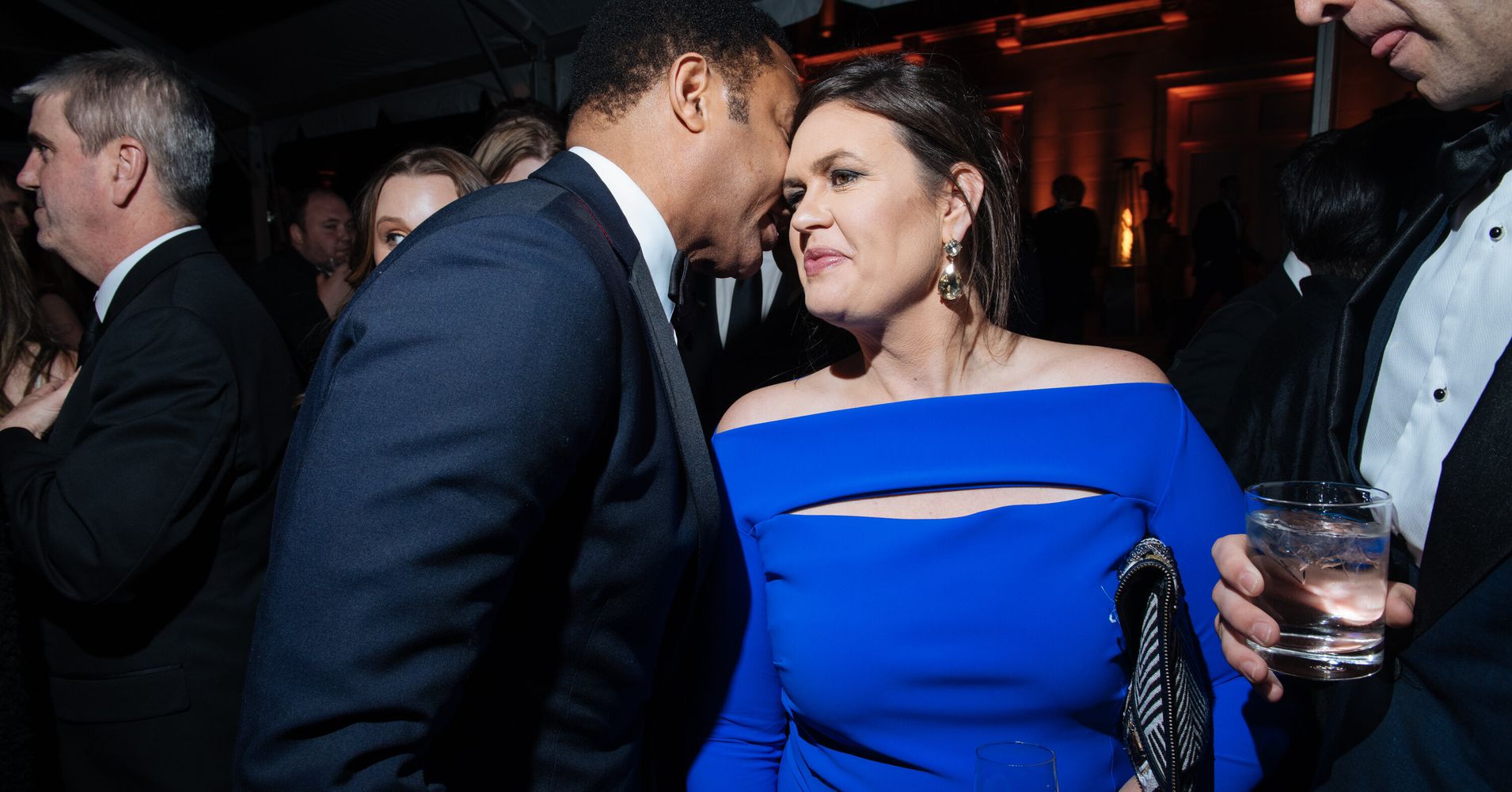[ad_1]

“Everybody has their issue with Sarah Sanders,” a White House correspondent told the Columbia Journalism Review at former White House press secretary Sarah Huckabee Sanders’ goodbye party, “but if you can’t have a drink with somebody, then all of civilization has broken down.”
The CJR party report — like those of the New York Times and the Washington Post’s Erik Wemple — featured other disturbingly cavalier quotes. Another unnamed reporter described the shindig to CJR as being like “the end of a battle, or a decent game of rugby, where at the end of the day you shake hands.”
Politico White House correspondent Anita Kumar, who co-hosted the event, told the Post she was pleased by the turnout. “And it taught me two things: One, we did the right thing, the thing that we always knew was right that I kind of second-guessed for a minute with all the criticism, which is, we’re meeting with the people that we cover,” Kumar said. (The event was widely questioned after HuffPost’s Maxwell Strachan first reported on plans for it last week.) Wemple also defended the event as a staple of beat reporting, yet when he attempted to ask Sanders several questions, she responded that it was not “the appropriate venue.”
The White House press corps, like many other political insiders, is accustomed to doing its job by certain rules — polite opposition, bitter professional battles leavened by personal friendliness. The collapse of the norms that govern their day-to-day work and socializing may strike them as the most noticeable change in the status quo. But preserving those norms, it’s clear by now, will do nothing to halt the national slide toward open, state-sponsored violence toward people of color and other marginalized groups.
This is the politics of civility, boiled down to its oblivious core: It’s not that civility will save us, per se. It’s that civility itself is what must be saved.
Defending Sanders from comedian Michelle Wolf, as many correspondents did after the 2018 White House Correspondents Dinner, did not prevent her boss from demonizing the press or from enacting policies like child separation. And yet the clamor for more mutual back-scratching continues, with the same righteous, disproven justifications. This is the politics of civility, boiled down to its oblivious core: It’s not that civility will save us, per se. It’s that civility itself is what must be saved.
And so it’s that “if you can’t have a drink with somebody” comment that’s particularly galling amid the current grotesque news cycle. What does it even mean to uphold a civilization in which bipartisan socializing continues, but our government pursues policies designed to inflict massive suffering and even death on vulnerable people? Civilization has already collapsed. The parties may just be the last vestigial twitches.
I thought of the comment when I read more reporting on the grotesque, intentionally inhumane conditions in the border detention camps, where children are denied showers, edible food and medical care. Children are dying in those camps. I thought of it when I saw a horrifying story, and photo, of an El Salvadorean father and his 23-month-old daughter who had drowned while crossing the Rio Grande because the family had not been permitted to present themselves for asylum at the border. I couldn’t stop thinking about it. It was the implication, I suppose, that there’s anything left to preserve by sharing a few laughs over a vodka tonic.
It’s past time to acknowledge that this isn’t the case, that things have already devolved past a cocktail party’s power to heal ― and that so many refuse to acknowledge it is viscerally maddening.
In the 1989 holiday comedy “National Lampoon’s Christmas Vacation,” the much-anticipated family gathering that Clark Griswold (Chevy Chase) planned has just come crashing down around his ears. Standing amid smashed porcelain, scorched carpet, and a shell-shocked extended family, his wife Ellen (Beverly D’Angelo) gently suggests that their guests go home before things get any worse.
“Worse?” yelps Clark, half-crazed. “How could things get any worse? Take a look around here, Ellen! We’re at the threshold of hell!”
What does it even mean to uphold a civilization in which bipartisan socializing continues, but our government pursues policies designed to inflict massive suffering and even death on vulnerable people?
As it happens, things could still get worse — once on the threshold, there’s always the option of stepping over it and directly into the flames — but Clark’s incredulous reaction is still essentially correct. Why downplay it? Every pretense of holiday merrymaking and family warmth has been stripped away; they’re no longer at a party, but in the midst of an ongoing catastrophe, a war against the forces of chaos. No gesture toward proper hosting etiquette can salvage the situation. Better to call things what they are.
In a 1941 Harper’s essay that now makes periodic rounds on social media, Dorothy Thompson enacts a little “parlor game” that gives the piece its title: “Who Goes Nazi?” Having been working as a journalist in Germany, Austria, and France amid the rise of Nazism, she explains, she’s grown familiar with the types of people who will, and those who would never. She sketches out profiles of various guests — a genteel but impoverished editor, an adoring wife, a blue-blooded horse enthusiast, a former child prodigy — and diagnoses them. Class is no predictor, nor is nationality. “Believe me, nice people don’t go Nazi,” she wrote. “Their race, color, creed, or social condition is not the criterion. It is something in them.”
But what’s most chilling, and vital, about the essay is that it observes a single party. All of these cozy elites of various stripes, and yet no assurance that their conviviality will prevent some from signing up with a white supremacist, fascist movement. We often discuss the rise of political extremism as the pure result of division, social rupture. If we’d only speak to each other more, continue having Thanksgiving together, attend each other’s parties, we could keep each other on track. History tells us otherwise. The rise of Nazism tells us otherwise.
Civility is a symptom of political well-being, at best. At worst, it’s the result of a disconnected, comfortable elite successfully suppressing the “divisive” concerns of people ill-served by their policies. It’s Joe Biden making common cause with virulent racists like Sen. James Eastland to advance policies harmful to black people, then congratulating himself on how evolved they all were back then for getting along. Civility alone is not worth saving. Even if we do, civilization can still break down, in all the ways that matter.
REAL LIFE. REAL NEWS. REAL VOICES.
Help us tell more of the stories that matter from voices that too often remain unheard.
[ad_2]
Source link

